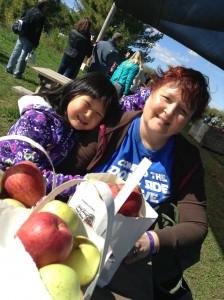A few weeks ago an article appeared in a major newspaper and online about the difficulties cancer survivors faced when trying to adopt. I reached out to Beth Gainer, a fellow survivor, blogger and writer who became an adoptive parent after having breast cancer. She shares her experience in the article that follows. Thanks Beth for the hope your story gives to those who don’t want cancer to rob them of the chance to have a child!

Adoption After Cancer
By Beth Gainer
I was diagnosed with breast cancer at a relatively young age. Although my mortality was on the line, I still had a burning question for my oncologist: Could I have a child after chemotherapy? He said my chemo regimen caused infertility in only about 1 percent of all cases. I felt reassured.
Until I found out I was in that 1 percent.
I was lucky to have lived, but when my gynecologist confirmed I was now infertile, life seemed cruel. I mourned my lost fertility because I wanted a child more than anything in the world. And now my dream of motherhood seemed out of reach, a giant cast-iron door slammed in my face.
After grieving for awhile, it occurred to me that maybe I could adopt a child and realize my dream of motherhood after all. However, I felt I had three strikes against me. I was recently divorced, would be a single parent, and — worst of all — I had cancer not that long ago. What adoption agency would want to work with me?
It turns out an agency did want to work with me.

This last administrative step seemed insurmountable to me. After all, what oncologist could guarantee I was healthy and would stay healthy, especially given my cancer history? Fearfully, I asked my oncologist if he would write a proof-of-good-health letter for my agency and for the Chinese government. He enthusiastically agreed and wrote a letter that met the proof-of-good-health requirement.
A word about my oncologist: he understands that living involves more than being free of cancer. He knows and encourages his patients to pursue their dreams, whatever their medical situations and outcomes.
His letter was the key to an unchartered door. After this final piece of documentation was submitted, I finally stopped sweating: My completed dossier was on its way to China.
After an excruciatingly long wait of four years — this had nothing to do with my health status but everything to do with the red tape of adoption — a beautiful baby girl was placed in my arms. That was six years ago.
Arielle is now seven, and motherhood is far better than I ever expected. She has given me immeasurable joy and love and a sense of purpose. And I got to realize my dream of raising a child, a dream I initially believed was out of reach.
Many people with prior serious health issues or pre-existing conditions automatically assume they will not be allowed to adopt. This is not necessarily true. It is true that survivors of serious illnesses must prove they are in good current health in order to adopt, but depending on the adoption and health situation of one or both adoptive parents, there’s leeway regarding health issues.
Last month, a press release indicated that a physician’s letter of good health for adoption purposes can be seen as discriminatory. However, I disagree. I believe that such a letter request is fair. Although the prospect of proving I was healthy frightened me when I was seeking to adopt, I knew that — given my cancer history — it made sense that my agency and China wanted to ensure I was currently in good health.
Of course, no one ever knows for certain that their current or future health is stable. All adoption agencies care about is that prospective adoptive parents are considered healthy. That letter of good health is the golden ticket for survivors of serious illnesses.
The press release also stated that “international adoptions had greater restrictions for prospective adoptive parents with a cancer history.” I have not found this to be true in my quest for a baby from China. In fact, greater restrictions were placed on me because I was single than because I survived cancer. At the time I was petitioning to adopt a child, China limited the number of single people who could adopt. I was put on a “singles” waiting list and had a longer wait than my married counterparts. I felt this single-mom quota was more discriminatory than China wanting to know I was healthy.
Nowadays, in the United States, domestic adoption is open, which means the birth parent(s) can choose the adoptive parents. If the adoptive parents are also willing, adoption can take place. It’s a beautiful, collaborative effort, but one fraught with a rollercoaster of emotions and unknowns. Domestic adoptions fall through for one reason or another, and — as with international adoption — prospective adoptive parents must be exceedingly patient in the adoption waiting game.
It’s true that a birth parent might not want to place her baby with a prospective adoptive parent with a cancer history. However, a birth parent might decide not to place her baby with a single prospective parent, one with a history of divorce, and/or a history of alcoholism for that matter.
Adoption is a long, often-tedious process, whether or not someone has always been healthy. The mounds of paperwork and the emotional upheaval of adoption are challenging for anyone going through this process. A cancer history adds an unknown variable into the mix, but adoption is fraught with many unknown variables in the first place. Still, if a person wants to adopt, he or she should go for it.
Adoption certainly isn’t for everyone, but it was the right route for me. For survivors who find themselves infertile, it is a viable way to creating or adding to a family. I’m so glad I didn’t allow my fears throughout the adoption process to get the best of me. Because my daughter always brings out the best in me.
Beth Gainer is an author who is completing a book on how to navigate the medical system. She blogs at Calling the Shots. She can also be contacted through Twitter at @bethlgainer and Facebook at https://www.facebook.com/pages/Beth-L-Gainer-Calling-the-Shots/133007320100661.

